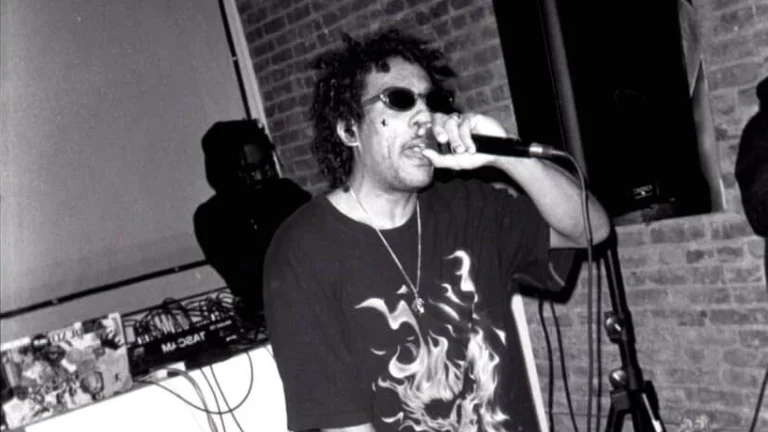Where’s the line between a musical persona and the musician themselves? With stars like Chapelle Roan and Ethel Cain pushing this question to the forefront of pop fans’ minds, the singer Lindsay Powell, whose musical alias is Fielded, explores this in their latest studio album, Chuckles Deluxe. A dreamy yet confident takedown of the modern world’s many manipulations. Playing into their “drag persona,” this release has allowed Powell to not only subvert many societal norms but also genre and production expectations that have built up throughout their career. Ultimately, this project dares to interrogate every listener about how they approach music, the people around them, and practically every other aspect of our lives.
Powell got their start in the music industry through many collaborations with rappers and producers on Backwoodz Studioz, a NY-based independent rap label repping artists like billy woods and Premrock. Their music still holds many R&B influences with lilting melodies and jazzy instrumentals, but Chuckles Deluxe draws more from dream pop’s hazy and reverb sounds. This is largely due to the album being the debut release of their own meditation and breathwork-oriented music label, Universally Handsome. Before it was released, Powell and I each relaxed on the floor of our homes to discuss the project over Zoom. After 13 years in the industry, they’ve had the chance to experiment with various genres—psychedelic, electronic, folk—but the craft is always on their mind. “I’m ravenous about music… so my genre is always evolving.” Their voice is key, though, due to its unique tonal quality comparable to Kate Bush’s ethereal vocals, with her undefinable crooning.
Their unusual voice matches very well with the “wild concept” behind Chuckles Deluxe’s creation. Laughing as they explained, they said: “I had this short film I wanted to make, this was literally 10 years ago, about a comedy club on top of a dominatrix dungeon and the interactions between the comedians and the dominatrixes. So I wrote the song Chuckles Deluxe [thinking it] would be the name of the club.” This root idea of seduction paired with humor birthed many songs initially, but the album took many years to marinate. The core theme emerging for Powell was always queerness in every meaning of the word. “[In the music industry] I often felt like a court jester amidst royalty,” explained Powell. “I didn’t have a voice—until it all clicked.” Coming to terms with their gender identity and relationship to queerness then clarified the concept, as they could see how they personally identified with the performers they were initially writing about.
This is basically the storyline of the song “Chuckles Deluxe.” In the track’s beginning, an almost carefree beat introduces us to this character who “was just there for absurdity.” But the singer and the tune stutter as they “come to from the deepest sleep,” realizing for the first time, “I’m still a fool in real life.” While this realization initially seems to hurt this self-proclaimed jester, they soon can “leave content,” seeing the “switchblade in her teeth.” Much of this feeling for Fielded as an artist came from Powell’s real-life exploration of their gender identity as a nonbinary person, grappling with how this presentation is often not taken seriously or completely ignored by the broader world. Further, they said, “I also feel like when I came out as nonbinary I had so much judgement towards myself about… what I needed to look like and how I needed to behave… as I’ve moved away from that, I’ve stepped into the true understanding of what that means for me.” Fielded, then, became an extension of the truest version of Powell’s self, fully dressing up as a clown for promotional photos for the record. This role isn’t just something to be looked down upon, but can instead become a defense, a fully realized and therefore stronger persona to slip into. That’s the core of Powell and Fielded’s relationship, with the persona being more of a projection than anything else. “I wear my heart on my sleeve,” Powell says. “[Fielded is] fully my experience.”
If anything, Fielded is not the character Powell has felt forced to slip into at times. Faking a version of yourself is something instead covered in “America,” the album’s fifth track. After listening to this reflective song over and over, I couldn’t get the line “the police state has you tied to your tendency to put yourself aside” out of my head. This is one of the jazziest songs on the album, allowing Fielded’s voice to lean into each note, drawing listeners in with its riffs. I could tell through their impassioned performance that this line was as impactful to Powell as it is to me, which their eager response to my line of questioning confirmed. They described watching friends “competing to stay alive” nowadays, particularly in big cities like New York: “I’m watching so many amazing artists working horrible jobs where they have to pretend to be themselves.” In these jobs that lower-income artists find themselves working in, they can’t afford to fully express who they are, for fear of losing a source of stable income. It’s dehumanizing, but “America” as a song attempts to sway you away from getting lost in that by deconstructing the structures that force people into these states. Instead, the song encourages us to lean on our communities, drawing out the “all kinds of love” we hold.
To connect with their true self, spirituality, particularly Reiki, plays a large role in Powell’s life. As someone who grew up in the church, they gravitated more towards New Age practices as traditional religion deterred them. The more time they’ve spent in that community, though, the more they’ve seen concerning similarities begin to creep in. Powell says, “Not only is whiteness very prevalent, but [they’re] preaching love and trust and meditation, but then transition into diet culture and money required to manifest!” (A modern-day tithing.) Through this pent-up anger came the song “Lose Faith,” a rock-inspired condemnation of every grifting narcissist out there. The track starts slow, with vaguely Asian-inspired chiming over the lyrics, mocking the cultural appropriation so common in these communities. Fielded flips between their own experiences of dealing with these faux practitioners and pretending to be one themselves, begging listeners to lose faith in these people who “weaponize [their] descent and [their] delusions.”
While “Lose Faith” is tongue-in-cheek, with a quick wit to tear down whatever foe Fielded is facing, all ends with the album’s final song, “Safe Now.” The song is a straight ballad that’s blatantly honest, with no bite attached. Fielded sings about a never-ending cycle of different lovers who are “the last person I’d be, and yet still the last person I’d leave.” Even out of one doomed relationship, “codependence begins again.” This track leaves listeners in an undeniably dark place after such a generally upbeat lead-in. At the same time, this feeling is a breath of fresh air, no matter how bitter. After all, the world around us mirrors this bleak sentiment. With the meat of the lyrics so focused on the United States’ socio-political climate, it’s only natural. This finale feels raw, messy, and honest—everything Chuckles Deluxe strives to be.
Fielded is also committed to continuing onward and seeing where this journey can take them. Before this album’s release, they hadn’t performed live for over a year and a half, trying to instead focus on making this album the best it could possibly be. Now, almost two months out in the world, they’ve been able to perform live again, which continues to coax out another aspect of Powell’s personality. “Recording and performing Fielded are two different people… there’s this new, live version of them ready to come out.” With it, new interpretations of the songs, too, can stew, and the mission of Chuckles Deluxe can be brought to the masses. As their elegant voice spreads out further and further, I’m brought back to the sixth track of the album, “Can You Feel It?” A swaying chant, the song describes that all too familiar feeling that “nothin’ I do’s ever good enough for you.” The you in question is the pitfalls of all these songs, our capitalistic overlords: “the man.” Despite it all, despite the system’s hold on us, if we can wrangle that special, weird part in all of us, the Chuckles Deluxe deep in our souls, “we’re gonna feel it.”





